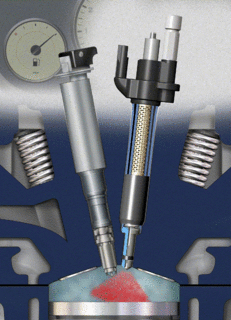 I checked Jeff Fisher's blog tonight and found this post, containing a 2001 Ford press release on Direct Injection for Gasoline engines. Now, I'm not a mecahnic or an engineer, but this seemed interesting, but also left me with some questions. According to Jeff's post, Direct Injection, which is more common in Diesels, can increase fuel economy in gasoline engines by almost 20%. But it seems that this lean burn is ideal at low rpm and allows higher compression. It also seems to work best on Four Valve engines.
I checked Jeff Fisher's blog tonight and found this post, containing a 2001 Ford press release on Direct Injection for Gasoline engines. Now, I'm not a mecahnic or an engineer, but this seemed interesting, but also left me with some questions. According to Jeff's post, Direct Injection, which is more common in Diesels, can increase fuel economy in gasoline engines by almost 20%. But it seems that this lean burn is ideal at low rpm and allows higher compression. It also seems to work best on Four Valve engines. So here are my questions, if today's multivalve engines are designed to perform at high revs with lower combustion ratios, and the lean burn of direct injection can actually be harmful to these engines at high rpm, what is the answer to the lean condition, auxilary injectors? And what do you do about the higher compression ratios and detonation/knock?
I'm sure these are the questions that industry engineers are working on right now, but if anyone has an explination that the average Joe might understand, please comment here.
Here is a Wikipedia entry on Direct Injection; http://en.wikipedia.org/wiki/Gasoline_direct_injection

5 comments:
I've updated my Blog posting to include some further information (including charts) on Ford's use of this technology in the MazdaSpeed6 sedan. An excellent first application of this new-to-Ford technology... also suggesting tremendous benefits if it were to be used on the modular engine family...
-Jeff
http://www.jwfisher.com
Jeff, thanks, I'm sure people will be interested in more information on this, if it truly is a trend we're likely to see in future cars.
One thing though, I haven't figured out how to permalink to that post. The link I have will bring readers to your Ford section of your blog. Can you let me know how to permalink?
Thanks,
Joe
Jeff, detonation is caused by the fuel/air mixture exploding before the ignition system has had a chance to spark it. The only why that I know of to get around this is to put higher octane fuel in the motor.
Octanes are hydrocarbons, like methane, butane, heptane and propane. Octane is C8H18 which is 8 carbon and 18 hydrogen atoms. The more of them you have in the fuel more compressed it can become before it 'explodes' because of the carbons. There are other things you can put in fuel to add octane, like iodine, but its expensive, it makes the motor dirty and causes damage.
Thomas Midgley, the inventor of the starter motor found octane because people blamed his starter for the detonation on a cadalac, and he set out to find what was the real cause, and how to fix it. Unfortunatly he did find other ways, like thermal cracking (refining, how they make unleaded fuel these days) but they were expensive back then, and he tried all sorts of things even ethyl alcohol based fuels like ethanol or methanol and so on, but unfortunatly it was 'TEL' or Tetraethyl lead that was used. Which was discovered decadeds before Midgley played with it, and was not used for anything because it was so poisonus.
Here in SA we can buy 120+ octane fuels at some gas stations, they come in 20L cans and are a little more expensive then 92 ( we get 97 at costal areas ) and its nicknamed quicksilver because it comes in silver cans and is used in quick cars ( and bikes in my case).
Oh, where in SA we also have a fuel company called SASOL that makes fuel from coal, they are the only company in the world that can do it, and they are highly advanced in the petrochem industry with the kinds of things they have invented. They used to hav 97+ on the pumps, meaning that its 97 or more octane, and I had a modified MX bike that would only run on that fuel without detonating/pinging.....
Protocol, I'm Joe, this is my blog, Jeff is JW Fisher, and I was inspired by his post at www.jwfisher.com
Thanks for writing, very interesting, the highest octane fuel I've heard of here in the states is 104 which is only available at race tracks and not reccomended for street use.
Joe
Post a Comment